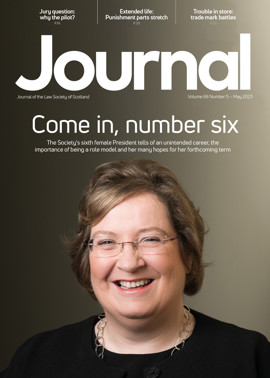Editorial: Double issue
Towards the end of April, two major bills were introduced to the Scottish Parliament in the space of five days. Both have the potential to make a significant impact on the Scottish legal profession.
First, the Regulation of Legal Services (Scotland) Bill paves the way for significant streamlining – and, we hope, cost saving – in the process that complaints against practitioners must follow, along with greater transparency in regulation and, at last, regulation of entities as well as individuals. But it also, in the eyes of many including the Society, encroaches on the independence of the profession through powers of intervention conferred on ministers, even if their use bears to be confined to certain situations and mostly subject to the concurrence of the Lord President.
Rather more headlines have been generated by the Victims, Witnesses and Justice Reform (Scotland) Bill, largely due to it taking forward the proposal by Lady Dorrian’s review for a pilot scheme of trials of serious sexual offences before a specially trained single judge, with no jury, in the Sexual Offences Court that the bill would also create. The furore that has created among criminal defence lawyers has almost obscured the fact that the bill would also finally abolish the once-hallowed not proven verdict, and cut the size of the Scottish jury to 12, still with eight votes required for conviction.
The issues raised by each bill are very different, but both could result in a trial of strength between the profession and the Scottish Government. With the Regulation Bill, the contest is more likely to be confined to the parliamentary arena: can MSPs be persuaded, for example, that enabling ministers to “directly authorise and regulate legal businesses”, albeit the provision presupposes the failure of the designated regulator, is simply not acceptable? The new Government has got off to a difficult start, but it is an open question whether party unity is likely to come under threat on this issue.
Even if enacted, however – and among politicians, sympathy for victims and witnesses may prevail over the protests of the profession – the pilot court seems vulnerable to the non-cooperation of defence lawyers, and at this stage a collective view is rapidly emerging against accepting instructions in any case sought to be brought through the scheme. The bill does not give accused persons the choice whether to be brought before the pilot court, only a right to make representations as to whether the criteria are met, but in effect they are likely to be able to opt out.
One can sympathise with complainers’ reluctance to have to relive their experience at trial, but other mooted reforms could greatly mitigate the trauma of giving evidence. As with not proven, if increasing the prospects of conviction is a principal aim, the profession would be right to take a stand.
Perspectives
Features
Briefings
- Civil court: Spotlight on the Sheriff Appeal Court
- Employment: Must do better – the s 23 approach
- Human rights: Crime, detention and mental health issues
- Pensions: A question of tax
- Scottish Solicitors' Discipline Tribunal: May 2023
- Family: The slide rule of grave risk
- In-house: A route to diversity






